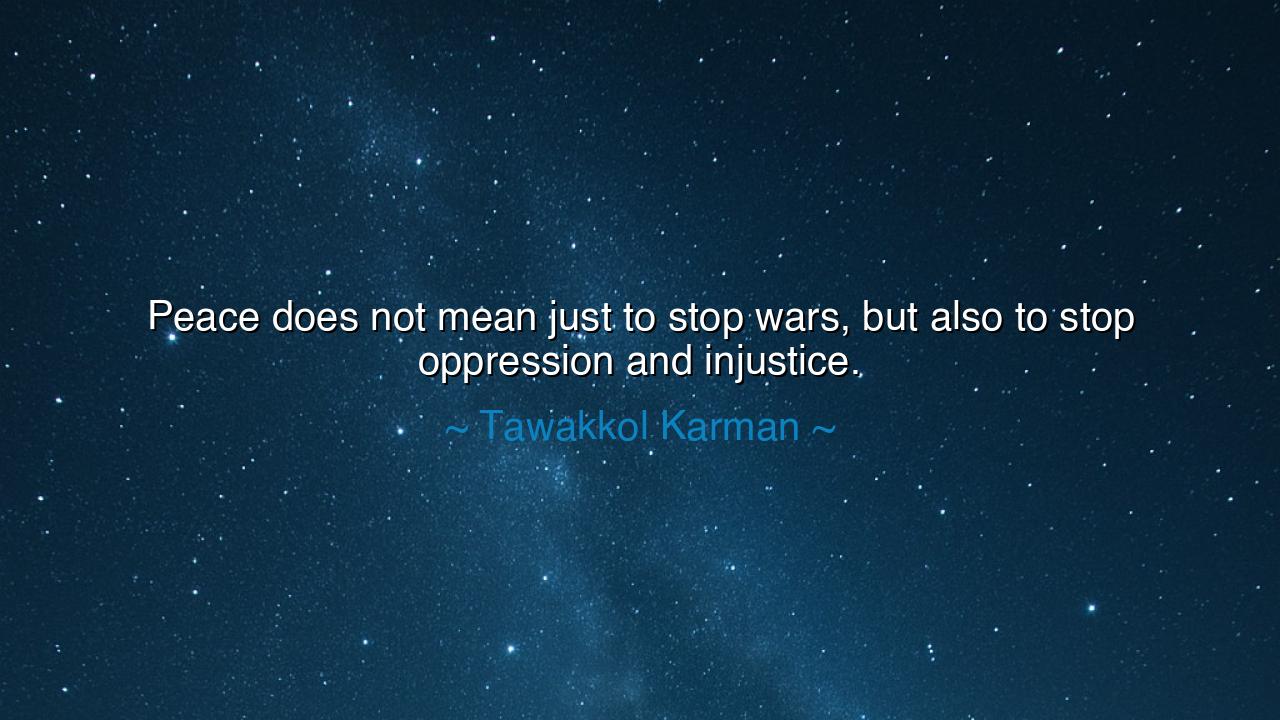
Peace does not mean just to stop wars, but also to stop






Hear the voice of Tawakkol Karman, Nobel Peace Prize laureate and daughter of Yemen, who declared with fire in her soul: “Peace does not mean just to stop wars, but also to stop oppression and injustice.” These words rise like a banner above the false promises of silence. For too long, rulers and conquerors have proclaimed “peace” when the weapons grew quiet, yet their people still starved, their voices still silenced, their chains still unbroken. Karman reminds us that true peace is not the stillness of fear, nor the quiet of submission, but the flourishing of justice, dignity, and freedom.
The ancients also knew this truth. They saw that the mere absence of battle did not guarantee harmony. For if the widow still weeps, if the orphan still suffers, if the poor still groan under the weight of unfair burdens, then war has only changed its form. The philosopher Augustine once wrote of the “unjust peace” of empires, where kings silenced enemies but still oppressed their subjects. Karman’s words echo this same warning: that peace without justice is but a mask, a shallow calm before the next storm.
Consider the story of the American Civil Rights Movement. After the Civil War, the cannons had grown silent, yet the African American people lived under segregation, humiliation, and oppression. Was that peace? No, it was merely the absence of war while injustice reigned. It was not until leaders like Martin Luther King Jr. rose with courage that the world was reminded: true peace is inseparable from justice. King himself said, “True peace is not merely the absence of tension; it is the presence of justice.” In this, his voice joins Karman’s across time and space.
To stop oppression is to strike at the deeper roots of conflict. For oppression festers in silence, and silence breeds rage. A society that denies education, that crushes women, that silences the poor, cannot call itself peaceful, no matter how quiet its streets. To stop injustice is to heal the heart of humanity, to restore balance so that people may live not in fear but in dignity. Karman, who stood against tyranny in Yemen, knew this truth in her bones—that as long as oppression exists, war is waiting just beyond the horizon.
The meaning of her teaching is therefore heroic: we must expand our vision of peace. Do not be deceived when leaders cry “peace” but leave the chains unbroken. Demand more. Work not only for treaties, but for schools where children can learn. Strive not only to silence guns, but to lift the voices of the voiceless. Build not only walls to hold back violence, but bridges that carry equality, compassion, and truth. Only then shall peace be strong, for it will rest upon justice, not fear.
And so, children of tomorrow, take this lesson as your own: peace without justice is fragile, a false dawn that will soon collapse. Seek peace that liberates, peace that uplifts, peace that defends the dignity of every soul. In your lives, this means speaking for the oppressed, standing with the weak, and rejecting the comfort of silence when injustice reigns.
For the world will always tempt you to accept a shallow quiet, to say “at least there is no war.” But remember the teaching of Tawakkol Karman: peace that tolerates oppression is no peace at all. Let your goal be higher—peace with justice, peace with dignity, peace with freedom. Then, and only then, will humanity find rest.






AAdministratorAdministrator
Welcome, honored guests. Please leave a comment, we will respond soon